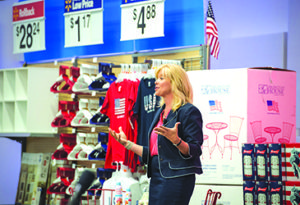BENTONVILLE, Ark. — Walmart surprised suppliers at its third “Made in the USA Open Call” event, promising that it would say yes to virtually every product pitched.

Gloeckler: “Walmart’s commitment is having a tangible impact”
“At a minimum, we’re putting every item pitched in open call on Walmart.com,” said Steve Bratspies, chief merchandising officer for Walmart U.S.
The promise came during the opening remarks at the open call event, which drew more than 450 suppliers of all sizes to meetings at four of Walmart’s headquarters buildings in Bentonville, Ark.
Bratspies’ announcement drew cheers from the suppliers, who were pitching everything from food to toys to apparel.
“It dawned on me that it would be great to just say yes to everything,” Bratspies explained. “So I challenged my team, and every time I challenge them they come through. They found a way to deliver and make every yes a reality.”
Walmart explained that the only exceptions to the “everything’s a yes” policy involve products that are not shelf stable, or those with hazardous materials.
“We are thrilled to put hundreds of new Made in the USA products on Walmart.com,” said Michelle Gloeckler, executive vice president for consumables, health and wellness, and U.S. manufacturing lead. “Walmart’s $250 billion commitment to buy products supporting American jobs is having a tangible impact on communities across the country as factories expand or open to make products for Walmart stores, Walmart.com and Sam’s Club.”
The open call pitch event — which included nearly 800 meetings between suppliers and Walmart, Sam’s Club and Walmart.com buyers — was part of Walmart’s fourth annual U.S. Manufacturing Summit. The first such summit was held in August 2013 at the convention center in Orlando, Fla. In January of that year, Bill Simon, who was then president and chief executive officer of Walmart U.S., said at the National Retail Federation’s Big Show conference in New York City that Walmart intended to dramatically increase the amount of merchandise in its stores that was made or grown in the United States.
“Three and a half years ago, we made a commitment to buy an additional $250 billion in products that support American jobs,” Gloeckler said in the general session that opened this year’s summit. “Jobs that are right here in the U.S., products that are made right here. We know that this matters not only to our business — because making goods close to where they’re consumed is good for business — but also to our customers.
“So I’m pleased to report that we’re right on plan. We have thousands of suppliers that are selling their American-made products on our shelves and on Walmart.com.”
The opening session also featured remarks from Walmart U.S. president and chief executive officer Greg Foran, vice president for U.S. sourcing and manufacturing Cynthia Marsiglio, and Arkansas Gov. Asa Hutchinson. Citing research by Boston Consulting Group, Walmart says its effort to promote and support U.S. manufacturing will create an estimated 1 million new U.S. jobs.
The impact on any given supplier who gains access to Walmart’s customers can be dramatic.
“Landing a deal with Walmart was huge for our small company,” said Courtny Squibb, the operations manager at Granger, Iowa-based Schultz Laboratories Mfrs Inc. “Since last year’s open call, our White Diamond metal polish is now in more than 2,500 Walmart stores and Walmart.com.”
In addition to meetings with buyers, suppliers at the 2016 U.S. Manufacturing Summit and Open Call were invited to attend educational sessions. In one, Walmart chief marketing officer Tony Rogers said that a “Made in the USA” label is a strong driver of purchase decisions, second only to price. Rogers and Matt Kistler, Walmart’s senior vice president of global customer insights and analytics, discussed how consumer perceptions of brands and products are impacted by such a label, and addressed how suppliers can engage with Walmart through the marketing of their products.
Another session looked at the global trends that have helped American factories become more competitive with their counterparts in China and elsewhere. Hal Sirkin, senior partner and managing director at Boston Consulting Group, talked about the ways that rising wages in other parts of the world, together with other factors, including the cost (both in money and time) of shipping goods across the ocean, are helping to make U.S. manufacturing cost increasingly cost competitive for many types of goods.
For suppliers considering bringing some of their manufacturing back to the United States from overseas, or for entrepreneurs looking to open their first production facilities, Walmart’s Supplier Academy also featured a panel discussion on navigating the complexities of locating or expanding domestic factories. Panelists Anita Hargett, a senior manager with Walmart’s tax team, and Nick Santoleri, vice president of manufacturing for global wet wipes at Rockline Industries, emphasized the financial and other help available to companies through local and state economic development offices.
At another session, called “Doing Business with Walmart,” James Cordero, senior director of Walmart private label strategy and sourcing, pointed out that another opportunity for suppliers who manufacture products domestically is to make store brand products for Walmart.
The day wrapped up with a closing session hosted by the Arkansas Economic Development Commission and Northwest Arkansas Business Council, and a networking reception featuring Walmart executives, including president and chief executive officer Doug McMillon.




You must be logged in to post a comment Login